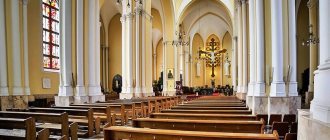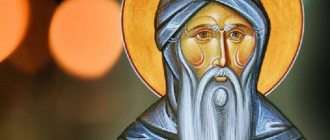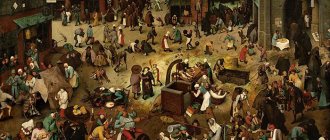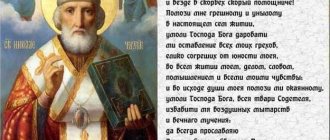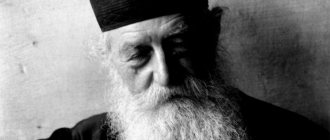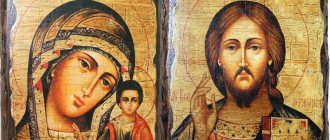Post history
Fasting existed during the times of the Old Testament, but Christians began to fast from the very foundation of the Church, following the example of the Lord Himself and the apostles. The oldest church writers claim that the apostles established the first 40-day fast in imitation of the prophet Moses and the Savior, who fasted for 40 days in the desert. Hence the name of Great Lent - Lent.
Some church scholars believe that the fast initially consisted of 40 hours. Ancient Christian books (II, III centuries) tell us about the custom of fasting for two days. The fast before Easter was 6 days, as Dionysius of Alexandria tells about it.
Thus, Great Lent (Holy Lent) in the form in which it exists today developed gradually. Church historians believe that it finally took shape when it became the custom to baptize converts on Easter and prepare them for the reception of the Sacrament of Baptism through a long fast. Out of a sense of brotherhood and love, all believers began to participate in this fast with them.
Already in the 4th century, Lent existed everywhere in the Church, but it did not begin everywhere at the same time and did not continue for 40 days everywhere. The fast was very strict. The ancient Christian writer Tertullian says that only bread, dried vegetables and fruits were allowed, and then not before the evening. This was called dry eating. We didn’t even drink water during the day. In the East, dry eating persisted until the 12th century, then not only vegetables, but also fish and even some birds began to be considered lean.
Any joy and fun was considered a violation of fasting. The general rule was to abstain from stimulating foods and consume even permitted foods in moderation.
In subsequent times, heresies appeared, some of which considered fasting to be the main duty of a Christian, others, on the contrary, completely denied its significance. The church rules, which generalized the experience of the first centuries, punish not only anyone who violates the established fast without necessity for health, but also those who claim that eating meat is a sin even on holidays, and condemns the consumption of meat food at permitted times.
During the days of Lent in Christian countries, all kinds of spectacles were prohibited, baths, shops, trade in meat and other fasting products were closed, and only essential items were sold. Even court hearings were stopped. Christians did charity work. During these days, slaves were often freed or released from work.
Posts are divided into one-day and multi-day posts. Multi-day fasts include:
- Great Lent, or Holy Pentecost.
- Petrovsky post.
- Assumption Fast.
- Christmas post.
One-day fasts include:
- Weekly fasts on Wednesday - in memory of the betrayal of the Savior by Judas and on Friday - in memory of the suffering and death of the Savior.
- However, there is no fasting on Wednesday and Friday of some weeks. These are: Easter week, which is revered as if for one Bright day; week after Trinity; the so-called Christmastide, that is, the time from Christmas to Epiphany Eve; Week about the publican and the Pharisee before Great Lent (so that we do not become like the Pharisee who boasted of his piety); Maslenitsa (although there is a ban on meat during it).
- The Feast of the Exaltation of the Holy Cross is September 27.
- The day of the beheading of John the Baptist is September 11.
- Epiphany Christmas Eve, that is, the day before Epiphany - January 18.
Great Lent or Lent belongs to the most ancient institutions of the Christian Church, which, in the person of our Lord Jesus Christ, preparing for His great feat by fasting for forty days in the desert, saw for itself the greatest and obligatory example to follow.
But our Lord Jesus Christ, having taught humanity by His example the greatest example of fasting and prayer, at the same time did not give positive instructions regarding the duration and time of such fasting. This was and is the undoubted superiority of the religion he founded over all others. To give complete freedom in satisfying such ineradicable needs of the human spirit as fasting and prayer meant imparting to the new religion hitherto unheard-of freedom and spirituality. This probably explains that the forty-day duration of Lent was established in the Christian Church not suddenly and not immediately, but only gradually, depending on the general development of the Christian cult. The earliest evidence of Pentecost is a passage from the letter of St. Irenaeus of Lyons (d. 202) to Pope Victor (189 - 198) regarding disputes about the time of celebrating Easter. This evidence is given by Eusebius in his Church History. Recognizing that the “mystery of the resurrection of the Lord” should be celebrated only on Sunday, he advises Pope Victor not to exclude from his communion entire churches that observe the custom inherited from their ancestors, i.e. They celebrate Easter on the 14th day of the first spring lunar month, like the Jews, no matter what day of the week this full moon falls on. Having taught such advice to Victor, St. Irenaeus adds to this: “They disagree not only about this day, but also about the very image of fasting: for some think that one should fast for one day, others two, and others more; some consider 40 hours of day and night to be the measure of their day.” Easter fasting, according to this passage from the message of St. Irenaeus, during the time of St. father, at the end of the second century, lasted where a day, where two, where even longer; where he embraced a period of time of 40 hours. In the fast of the times of St. Irenaeus we see, thus, the main grain of St. Pentecostals. True, this post during the time of St. Irenaeus corresponded only to the last days of our Holy Week. But it was natural that Great Lent should begin with the establishment of its most important part - Holy Week, when its Bridegroom was taken away from the church and when the Divine Sufferer melted away in his death throes on the cross. On the other hand, in the words of St. Irenaeus also indicated that already at that time Christians were presented with the idea of fasting for forty days in imitation of Christ. If for now fasting has been defined in practice not at forty days, but at forty hours, then this phenomenon is explained by the special nature of ancient Christian fasting. Ancient Christians imagined fasting and performed it in the form of complete non-eating of food. Spending more than two or three days without food was not safe for life. The current church charter for the three days of Lent (Maundy Monday and Tuesday and Good Friday) requires fasting in precisely this ancient form. Moreover, it is significant that among these days Good Friday is indicated, the day of the Lord’s crucifixion, which, according to the most probable assumption, should have been limited to the pre-Easter fast at first. The extension of fasting to a forty-day period took place only towards the end of the 3rd century, but not everywhere and not at the same time. In some places, and by this time, the extension of Lent occurred only within the boundaries of Holy Week. At least St. Dionysius, Bishop of Alexandria, when asked by Bishop Basilides when the Easter fast should end, whether on Saturday evening or Sunday morning at rooster crowing, as is done in Rome, replied: “and the six days of fasting are not observed by everyone equally and in the same way; for some spend all their days without food, and others not a single one; for those who are very weak from prolonged fasting and are almost dying from exhaustion, eating food earlier is forgiven; but if the other four preceding days of fasting not only did not fast without a break, but did not fast at all and even lived luxuriously, and then, when the last two days come, they, that is, Friday and Saturday, fast continuously and think that they are doing something great and gloriously, if they abstain until the morning, then I think that they were not in such a feat as they practiced several days earlier.” From the above passage it is clear that in Alexandria at the end of the 3rd century they fasted for a week before Easter, that only our Holy Week was formed there, and besides the great severity in polishing this week there was some freedom in observing it. Dionysius of Alexandria does not yet say anything about the forty-day fast before Easter. But along with the testimony of Dionysius from the same time, we have the testimony of Origen about the forty-day fast before Easter. In his commentary on chapter 10 of the book of Leviticus we read: “So the Jews fast because they have lost the Bridegroom (Christ); We, having the Bridegroom, cannot fast. We say this not to weaken the bit of Christian abstinence. For we also have the days of Lent, dedicated to fasting”... The apparent contradiction between the two passages cited is explained in the fact that Origen had two fatherlands, besides Egypt and Alexandria - Palestine and Caesarea. In his interpretation of the book of Leviticus, he apparently has in mind the practice of the Church of Jerusalem, where the idea of fasting for forty days could most easily arise and be realized, as in a church close to the places in which the Savior’s forty-day feat took place. The immediate reason for extending the pre-Easter fast to forty days was the so-called catechumenate, i.e. the custom of long and solemn preparation for baptism for those wishing to accept it. Baptism was performed mainly on Easter and the catechumens prepared for its reception by long fasting and prayers. Out of a sense of brotherhood and love, all believers began to take part in the fast of the catechumens. By the beginning of the 4th century we find the post of St. Pentecost has become widespread in the Christian world. It is mentioned primarily by the fifth rule of the Council of Nicaea. This rule appoints for one of the two councils, which are held annually in every church, the time before Pentecost, indicating as the basis for such a period, “so that after all dissent has been eliminated, a pure gift will be offered to God.” Eusebius of Caesarea writes: “we celebrate Easter, taking upon ourselves a forty-day labor to prepare for it”; “Before Easter we strengthen ourselves with forty days of fasting for 6 weeks.” Athanasius the Great mentions Pentecost in his Easter letter of 330 and in other writings. St. repeatedly mentions her. Cyril of Jerusalem. The extension of the forty-day fast to 7 weeks was caused by the fact that the number of fasting days should not have included not only Sundays that fell during Lent, but, according to the view of the Eastern Church, Saturdays as well. Thanks to these exceptions, the pre-Easter fast of forty days would not give 40 days of fasting and would not correspond to the idea of Lent. With the exception of some Sundays, the six-week fast, however, still gave the significant number 36 (6X6), which Pope Leo the Great explained as a tithe of the entire year. But since in the east Saturday was excluded from the number of fast days, in order to get at least the number 36 for the fast days of the pre-Easter fast, it was necessary to lengthen it to 7 weeks (5 × 7 = 35; with the addition of Holy Saturday - 36 days ). Along with the lengthening of the pre-Easter fast from three days to forty days, and then seven weeks, the form of polishing also underwent changes. The historian Socrates, who introduces us to the gradual lengthening of the pre-Easter fast, also provides information about the development that the very form of polishing experienced by the 5th century. “The disagreement,” he writes, concerns not only the number of fasting days, but also the concept of abstaining from food; because some abstain from eating all kinds of animals, others of all animate animals eat only fish, and some eat birds along with fish, saying that birds, according to the legend of Moses, also originated from water. Some even abstain from fruits and eggs, others eat only dry bread, some do not take even that, and others, fasting until the ninth hour, then eat all kinds of food.” From the above testimony of Socrates, it is first of all clear that after the church accepted, as one of the possible forms of polishing, abstinence from meat, an exception was made for certain types of meat, and not only for fish, as at present, but also for birds. But this last exception, as not having serious grounds for itself, soon disappeared and one exception concerning fish remained in force. When allowing the consumption of fish during Lent, they could be guided by the consideration that God’s curse after the Fall was directed specifically at the earth and its inhabitants, and not at the water and its inhabitants. Socrates indicates the next degree in fasting is the non-consumption of fruits and eggs. Judging by this, one must think that in the time of Socrates, the difference between one and the other was not always established from the point of view of ascetic abstinence. We still have traces of such practices and such views in the form of fasting that the church allows for cheese week. The last words in Socrates' testimony indicate that what was considered significant in the pre-Easter fast and in the 5th century was not so much the type of food as the duration of abstinence from it. The essential thing in fasting, as in the first centuries, was recognized as the fact that on a fast day there was no daily meal, but only one dinner, i.e. food was taken once a day, late in the evening, and not twice, as was usual. This assumption is confirmed by evidence from other writers of the same era. “Wait a little (with food): the end of the day is soon,” said St. Ambrose is on duty. “You wait until evening to eat, but spend the whole day in court,” the saint denounced. Basil the Great to his listeners during Lent. “Let us not think that just not eating until evening is enough for our salvation,” said St. John Chrysostom; “What is the use of fasting, tell me, if you don’t eat for whole days, but indulge in games, jokes, even perjury and slander all day long?” “N the days of fasting, exhorts the blessed one. Augustine, what we eat for lunch, we will use for the poor, and not for preparing luxurious dinners with dishes for the most refined tastes”, etc. - In accordance with this practice, the current charter considers “one meal” a necessary condition for fasting. Based on the above testimony of Socrates, one can think that initially, after the end of the day, in the evening during fasting they ate all kinds of food, only in limited quantities, of course. But gradually we came to the idea of the need to limit ourselves during fasting and the type of food. The borrowing this time was made from hermitic fasting practice, since the types and degrees of this limitation strikingly coincide with this practice that preceded the establishment of Pentecost. The most accepted food among ascetics was bread and vegetables. Such food became common everywhere and for Lent. Pilgrim Silvia says about the Jerusalem monks that they “during the days of Lent do not eat a crumb of bread, or butter, or fruit of the tree, but only water and a little flour stew.” Such food gradually became common during Lent and for the laity. The Council of Laodicea demands “to fast throughout Lent with dry eating.” The extension of fasting to a limit of forty days and seven weeks did not weaken or change its universal obligation in relation to all Christians. The Apostolic Rules, a monument perhaps older than the 4th century, are presented in the name of St. the apostles, a clergyman was defrocked, and a layman was excommunicated (from communion) for non-observance of Pentecost. “Which Christian does not fast on St. Pentecost, says St. Ambrose of Milan, he reveals treachery and stubbornness. What kind of Christian are you if you are satiated while the Lord is fasting?” “Fast on other days,” says Bl. Augustine, there is medicine or merit; not fasting on Lent is a sin.” N. Make peace with others
For the Sunday before Lent
“If you forgive a man their sins, your heavenly Father will also forgive you,” and if you do not forgive a man their sins, your Father will also forgive you your sins” (Matthew VI, 14-15). This is the very first and necessary condition that every Christian should keep in mind when entering the gates of St. Pentecostals and preparing for repentance. Now all Orthodox Christians around the globe are animated by one thought, one common desire, that the Merciful Lord would forgive and not remember the countless sins of our lives, with which we have offended His holy will. And this greatest benefit - the forgiveness of our sins, the Lord made dependent on ourselves, on how we ourselves act towards others. It’s as if He now says this to each of us: “Here you are asking me to forgive and forgive all your sins. I am gladly ready to forgive you everything, but only first show yourself that you know how to forgive your neighbors; First, you yourself will sincerely and sincerely forgive everyone who has caused you any offense, evil or trouble. If you do not want and do not find it possible to reconcile with your neighbors, to forget everything they have done to offend you, then know that you are unworthy of the forgiveness of your sins; the entire burden of responsibility for them remains on you until the Last Judgment.” This is the decisive condition that the Merciful Lord sets for us, and without which all our deeds - fasting, confession, prayers, prostrations, and Divine Communion will serve not for salvation, but for judgment and condemnation. Why did the Lord condition our repentance in such a way and put it in such a close connection with our personal relationships with the people around us?.. Is this demand caused by some essential necessity?.. The mere fact that this demand is presented to us by God Himself is better All evidence testifies that it is not accidental, but rests on the highest moral laws of Divine Truth. And in itself it is completely clear and understandable to our inner immediate consciousness. Our conscience involuntarily feels all the irresistible truth of this command of God, and is always embarrassed and aware of itself as guilty if it does not find complete, fraternal peace with everyone. This demand of the Savior embodies the very spirit and essence of our entire religion. The Lord Jesus Christ, by His terrible sacrifice on the cross, reconciled us with the Justice of God; We also need to make peace with our neighbors while we are still on the path of life. Otherwise, we pronounce judgment on ourselves. Then the Justice of God itself will stand up for the offended; “Judgment is without mercy to him who has shown no mercy” (James II, 13), says the Word of God. In the old days, in Rus', the Sunday before Lent was a significant day and presented a touching, touching sight. On this day, Christian love seemed to descend from heaven to earth and united everyone with fraternal bonds of forgiveness and peace. Beginning with the king and ending with the last commoner, everyone, young and old, mutually asked each other for forgiveness, often forgetting their ranks and social position, bowed low at each other’s feet and sealed the sacred act of reconciliation with a brotherly kiss. But time passes and with its flow washes away many wonderful customs that we should carefully preserve as the best heritage of our ancestors. We now like to laugh at the simplicity and patriarchal morals that our ancestors lived by, but in reality this patriarchalism contained a lot of things that we could learn with benefit for ourselves. Where, for example, will you now find even faint traces of that touching Christian custom that we just mentioned and which would deserve constant imitation?.. The day remains the same, its church meaning has not changed, and its former name has also been preserved: “forgiven Sunday,” but this name has now become empty, without a meaningful sound. Now, if they say goodbye, it seems that they only say goodbye to Maslenitsa, and not at all to those with whom they should - not to their neighbors with whom they have one or another hostile relationship. This is how they will begin fasting - with enmity in their hearts, as if God’s commandment about reconciliation with everyone applies to others, but allows for exceptions for them... They say that generations are always improving. Maybe, but not in the moral sense; in this respect we are moving backward rather than forward. What was bad in the old days we keep inviolable, but what was good we have abandoned and forgotten; Maslenitsa, for example, we left, and we completely abolished Forgiveness Sunday and the sacred custom of mutual forgiveness associated with it. Dry, cold formalism and purely pharisaical hypocrisy - this is what most gnaws at our present life in all its various manifestations! We live in some kind of false, artificial relationships that we ourselves have created and which we consider something natural and normal. Unfortunately, we often introduce this deadening formalism, lies and pharisaism into our religious life and poison all its activities with them. A living, pure connection with God, worship of Him “in spirit and truth” (John IV, 23), which is what religious life consists of, - all this is now being turned by many into an empty, lifeless form. We satisfy our religious needs only externally, and do not at all put our soul into them. Behind the external form, we have overlooked the very spirit and essence of our faith... Look, for example, how we are carrying out the great work of fasting and repentance! It is served by many as some kind of burdensome duty, and is usually limited to just external rituals. And where is the animation of the heart, sincere impulses towards reconciliation with God, contrition and crying for sins, firm determination for correction?.. Where, finally, is the very consciousness of what happens at the moment of confession, the consciousness of the greatness and power of this sacred sacrament?.. Ours the soul has become so hardened that it is not at all touched or softened by even such a greatest manifestation of God’s mercy as the sacrament of repentance. Will we then want to understand and implement this great commandment of love, to which the Lord conditioned our repentance and which, first of all, requires complete reconciliation with everyone? To forgive the enemy, who, perhaps, has inflicted a blood offense on us!.. To forget and tear this offense out of one’s heart!.. Is that really possible!.. This means giving him complete freedom and a reason for new insults!.. So Our pride usually becomes indignant and protests in response to the conciliatory demands of the Gospel. Oh pride!.. How powerfully she took us into her nets and entangled our unfortunate soul with them! She quarrels us with others and she does not allow us to put up with them. What kind of arguments does she put forward to interfere with the holy cause of reconciliation!.. In a proud darkening, it all seems to us that we are humiliating ourselves when we ask another for forgiveness - that by doing this we expose our weakness, admit ourselves defeated and bring triumph to our enemy, who he himself will despise us. But this is all a complete lie that our pride inspires us with. Forgiving an enemy is not a sign of a weak soul, but of a great soul, demonstrating its moral superiority. After all, you don’t get angry with children when they, out of stupidity, say or do something unpleasant to you; you willingly forgive them for their offensive pranks, because you consider yourself superior and smarter than them. You express the same moral superiority when you generously forgive your adult enemy. And believe that he will immediately appreciate all the nobility of your act and recognize your advantage; It often happened that in this way the worst enemies became friends. Saint Chrysostom rightly says that David won a greater victory when he spared Saul than when he overthrew Goliath. He who takes revenge for an insult puts himself on the same level as his enemy, and he who forgives him rises immeasurably above him. And the high moral satisfaction that our conscience experiences when we forgive our enemy serves as a clear sign of God’s favor and abundantly rewards us for the insignificant work that this glorious victory cost us. Experience this for yourself, and you will understand better than any words what a wonderful, unearthly pleasure it is to forgive your enemy! peace! May this Sunday be truly forgiven for us, and not just by its usual name!.. Let us at least now please our beloved Savior, and in the name of His Divine love, let us forget all the quarrels, disputes and disagreements that prevent us from living with each other brotherly friend, as He commanded! Let us compete with each other in nothing other than generosity, and let each of us be the first to extend the hand of reconciliation to his enemy! If anyone does not have enough spirit for this and begins to hesitate, then let him remember what the Lord has bequeathed to us for eternity: “If you do not forgive men their sins, neither will your Father forgive you your sins!” Priest M. Smirnov.
About Maslenitsa and Lent
Are we Christians? Yes? But why then do Christians, in those moments of their lives when they should most of all be Christians, behave in a non-Christian way; in those days when they should primarily be faithful children of the Church, they, it’s hard to say, are rebels . Maslenitsa has arrived, and look around: everywhere there is a feast, screams of debauchery, some kind of wild madness. Go to an Orthodox church, listen to the chants and prayers of the church. You will hear crying, grief, lamentation here... Why is this? Yes, because the Church, precisely in this week of unbridled revelry, remembers an event that cannot be imagined more difficult and more bleak than that - the sin of Adam, worthy of a sea of tears! But what then does it mean that in these very days, when our mother Church cries with bitter tears, she is abandoned, abandoned, forgotten by everyone?! Her children feast and rejoice... The fall of our ancestors - after all, this is the triumph of Satan, the victory of the devil's power? Brothers, let's celebrate her holiday!.. In a terrible whisper, looking back at life, seeing feasting, revelry, rejoicing, she, this satanic power, says: - I destroyed them?!.. Did I make their life gloomy and dark?! But this is not true, the world rejoices and rejoices, being in my hands... Whoever has eyes, look: remembering my service, people indulge in crazy, uncontrollable joy... Let the Church cry - for that the whole world rejoices "... Oh, wonderful holiday! What sacrifices will they spare for him? Forgotten household needs, sick, hungry children, helpless elders... How much noise, fights, mutilations, foul language, blasphemy, how many murders... Lord, but why all this? And when will we wake up?! And when will we curse this holiday of Satan? And when will we begin to fight our destruction!!! Tomorrow is fasting: the sad ringing of bells, songs of repentance, a time of crying, lamenting one’s sins. The time of fasting is not a time of boredom. He who sincerely fasts does not get bored, he rejoices because he realizes that the Lord did not abandon his sinful soul with his love, that the King of Kings has much mercy. Denouncing the Pharisees for their deceitful, hypocritical fasting, for the fact that while fasting they made sad faces, the Lord said to the surrounding people: “But you do it wrong... When you fast, anoint your head and wash your face,” i.e. ... do not be sad that you give the spirit the opportunity to triumph over the power of the flesh, on the contrary, rejoice, wash your face, appear cheerful. How much consolation, how much joy, in fact, fasting brings to every sinful, immensely sorrowful, almost despairing human soul. This soul seems to hear the voice of the Savior: “Look how I love you, you have been sinning for a whole year, adding sins to sins, iniquities to iniquities, you thought little about spiritual joys... You deserved a heavy punishment, you could have died an unrepentant sinner and even then time when I indulged in my favorite passions... And I took pity on you, listened to your groan and, like drowning Peter, I stretch out my strong hand... Like a bleeding wife, hold on to the edges of my robe, and I will have mercy on you, I will be reconciled with you, I will unite with you and be live in you! There is so much love, mercy, and long-suffering of God in these words... Glory to the Lord, who has mercy and saves us! But, woe is ours, not everyone hears this saving voice, not everyone feels the endless love and mercy of Christ... Tomorrow is fasting... Is fasting necessary? - They say. In recent days, many people seem ready to resolve this issue in the negative. “It is not what is in the mouth that defiles”... Of course... But they forget that the Lord still fasted for 40 days before coming and “appearing to the world.” So, for some reason the post is needed. Why? The Church founded by the Lord Jesus Christ is the Kingdom of God, into which we enter at the baptismal font. And as long as we preserve the purity and innocence acquired in baptism, we are not only living members of the visible Kingdom of God, but “the Kingdom of God is within us,” since “the Kingdom of God is truth, peace and joy in the Holy Spirit.” But this state is short-lived. Even in the years of our childhood, a congenital disease affects us. For some time - for some more, for others less - this disease seems to be hidden and ashamed to come out, but when we mature, we quickly get used to our new, already sinful state. From this ill-fated time we find ourselves outside the kingdom of God. Truth, peace, joy in the Holy Spirit leaves us. Lies, confusion and great confusion fill our entire being. Now, through our own efforts, we must acquire and return the rights we have lost, we must again approach what was so close, again seek the Kingdom of God, strive for it, just as those who have fallen must again rise to the mountain of the Lord, which only those who are innocent can ascend hands and pure in heart. And hence, the Christian life should least of all be pictured to us as a time and place of pleasure. It is a constant striving, a constant effort, a constant feat, a constant struggle of a person with himself. Like fighters, we must be ready to fight, stand on guard and fully armed with our strength. And if the state supplies its soldiers with weapons, trains them, tests them and, finally, leads them to war, so the Church supplies its members with spiritual weapons, teaches and tests them. Fasts, and especially the Great Fast, are designated for the training and testing of warriors, these ascetics of the Kingdom of Christ. But if fasting is needed as a time, firstly, for our self-examination and self-correction, secondly, as a convenient time for propitiating God, and thirdly, as the best time for participation in the suffering of the Savior, it is necessary to find out what the nature of fasting should be, or, to put it more simply, what it should be expressed in. Views of modern society on fasting diverge to the extreme. While some understand it only as abstinence in food and drink, they do not think about abstinence from spiritual vices: from anger, envy, quarrels and strife. And, meanwhile, the one who would avoid all this for the sake of fasting, he would be fasting in the best sense of the word. Purity of the heart, illuminated by the radiance of the fire of love, is a necessary, most important condition for the repentant mood of every person. Otherwise, we fall into hypocrisy, into that gross pharisaism that Christ so jealously denounced. The Holy Church, protecting her spiritual children, from the very first day of Great Lent, begins to cry out for the need not only for bodily fasting, but also for spiritual wakefulness, abstinence from spiritual passions that corrupt the soul. “As we fast, brethren, physically, we fast also spiritually: let us resolve every unrighteous alliance, we will give bread to the hungry, we will bring the bloodless poor into their homes.” These are the tasks, these are the duties that we need to fulfill in order to receive from Christ both great mercy and forgiveness of sins. But in our society other speeches are also heard. “It is not what is in the mouth that defiles”... Consequently, bodily fasting is both unnecessary and useless. Erroneous view and cruel delusion! The Lord Himself physically, without eating any food, fasted for 40 days before His appearance in public service and by fasting defeated the dark power of the devil. Of course, food is not the goal, but it serves as a means to suppress spiritual ailments and passions in a person. A person who fasts, but is proud, envious, grumpy, stingy - he is what he was, and will probably remain so. But it is also true that without abstinence in food there can be no spiritual fasting. A satiated person does not sympathize with the suffering of the hungry, the poor - and this is because he does not know these sufferings, because he is rather inclined to satisfy his passions. Those people who claim that only spiritual fasting is necessary, they most likely do not fast in any way: neither physically nor spiritually. So, we have lived hitherto according to the law of the world, we moved away from the eye of the Father, we wanted to be free from all divine and human moral laws. And what did our freedom give us?! What has the world given us?!! He took from us the purity of our souls and the robe of innocence and covered us with sackcloth and dirt, he took away from us peace and joy in the Holy Spirit and filled our soul with confusion, disappointment and mortal melancholy. He removed us from the shelter of the Father, deprived us of heavenly food - from the children of the Heavenly King he made us shepherds in his fields, feeding us food worthy of foolish animals; During the time of sorrow, weeping, and moaning of the Church, he made the feast of Satan, this wide Maslenitsa, with its revelry, drunkenness, and gluttony. It's time to come to your senses! It's time to tell your soul the wonderful and touching words of the canon of St. Andrei Kritsky: “Where will I start crying?” Let this not be a cry of despair, but a cry of hopeful sorrow... Let this cry of prayer be imbued with deep faith that Christ the Savior “will not despise a word, below images, below lack of study” and will accept prayer, although offered “from bad lips, from a vile heart, from an unclean tongue, from a soul defiled.” When we enter into fasting, we enter a refreshing atmosphere, full of new, reviving forces. Let us absorb into ourselves this life-giving aroma of the sacred poetry of Lenten services, and let us complete the “lenten course” for the glory of God and for our own spiritual benefit. And then, renewed in St. the sacrament of the Body and Blood of Christ, let us go, each on our own path in life, but certainly before God, devoting to Him all our joys, all our thoughts and even our whole lives. Blessed is he who has not given over the temple of his soul to the flames of passion; Blessed is the one whose thought is always holy, Who does not regret being humble, And who lays down joy and sorrow at the foot of the Cross. /“Coming.” Priest,” No. 1./ / “Vladimir Diocesan Gazette” Unofficial Department No. 8 (February 23, 1913)./ Lent
Calendar of Orthodox holidays and days of remembrance
RUSSIAN ORTHODOX CHURCH
Copyright © 2022 Unconditional love
Lent
Lent consists of: 40 days (Lent);
two holidays (Lazarus Saturday and Palm Sunday), as well as Holy Week - a total of 48 days. It is called Great not only because of its duration (it is longer than all the others), but also because of the great significance of this fast in the life of a Christian. In addition to the 7 weeks of fasting itself, the charter prescribes another 3 weeks of preparatory weeks for it. They begin with the Week of the Publican and the Pharisee. From the beginning of the 3rd week until its end, there is no longer any meat at the meal; it will appear only at the breaking of the fast during the Easter meal. The entire week is also called Cheese Week, or Maslenitsa, because the main food during it is dairy products, fish, eggs, and cheese.
3 weeks before Great Lent, on Sunday, when the Gospel text of the parable of the tax collector and the Pharisee is read at the liturgy, the Lenten Triodion, a book of liturgical texts that determines the features of worship during Great Lent, begins to be used in worship.
On Sunday, which is called the Week of the Publican and the Pharisee, at morning they sing a special prayer of repentance from Psalm 50: “Open the doors of repentance...” This is the beginning of preparation for fasting. The singing of the prayer of repentance continues at matins on Sundays (Weeks) of the 2nd, 3rd, 4th and 5th weeks of Great Lent inclusive.
The Week of the Prodigal Son is the second preparatory week. On Sunday, during the liturgy, the Gospel with the parable of the prodigal son is read. At Matins a new penitential chant sounds: “On the rivers of Babylon...” (Psalm 136).
The week of the Last Judgment is the third preparatory week. On Sunday the Gospel of the Last Judgment is read. This Sunday is also called meat-eating Sunday, as it is the last day of the meat-eater. From Monday until Easter you cannot eat meat.
On the eve of Meat-Eating Sunday - Ecumenical (Meat-Eating) Parents' Saturday. On this day, the memory of all Orthodox Christians who have passed away from time to time is commemorated.
The week following this Sunday is called Maslenitsa.
Week of remembrance of Adam's exile - Forgiveness Sunday. On this Sunday, a Gospel passage is read about forgiveness of offenses and fasting. Adam's exile is remembered in many liturgical texts. In the evening, everyone gathers at the temple for the rite of forgiveness. The service is already fast, the vestments are black, bows and singing of repentance. At the end of the service, a sermon is read about forgiveness of offenses, about fasting and a prayer with a blessing for Lent. The clergy, starting with the eldest, ask the people and each other for forgiveness. Then everyone approaches the priests in turn, bows, asks for forgiveness and forgives them all their sins and offenses, while kissing the cross and the Gospel as a sign of the sincerity of what is being said. The parishioners ask each other for forgiveness. Such forgiveness of mutual offenses is an indispensable condition for the purification of the heart and the successful conduct of Lent.
Lent differs from the rest of the year in special services.
Firstly, the Divine Liturgy is not served on Monday, Tuesday and Thursday (except for several holidays), the Liturgy of the Presanctified Gifts is celebrated on Wednesday and Friday, and the Liturgy of Basil the Great is celebrated on Sundays.
Secondly, in worship the volume of texts read from the Psalter increases, and singing becomes much less.
Thirdly, the prayer of St. Ephraim the Syrian is read with 16 bows, waist and prostration. Special prayers with bows and kneeling are added to the service.
All these differences determine the special spiritual atmosphere of Lent, which is not typical for the entire year. Orthodox Christians visit church more often than ever so as not to miss special services.
First week of Lent
Reading of the Great Canon of Andrew of Crete on Monday, Tuesday, Wednesday and Thursday at Great Compline. On Wednesday morning the first Liturgy of the Presanctified Gifts. On Friday morning, after the liturgy, there is a prayer service with the consecration of the koliva (in memory of the miracle of the Great Martyr Theodore Tiron). Kolivo is boiled grain with dried fruits, most often rice with raisins. The consecrated Kolivo is distributed to those present in the temple and consumed on an empty stomach on the same day. The first week ends with the First Week, that is, the first Sunday of Lent. This Sunday marks the Triumph of Orthodoxy - the restoration of icon veneration at the VII Ecumenical Council.
Second week
On Saturday - remembrance of the dead. On Sunday evening, many churches serve the first Passion - worship of the suffering of the Savior. This is a service with an akathist to the Passion of Christ. The remaining three Passions are served on subsequent Sundays. Although Passion is not a statutory service, it has already become part of a pious tradition.
Third week
On Saturday - remembrance of the dead. The week ends with the Third Week, the Worship of the Cross. The day before, at the Sunday all-night vigil, the Cross of the Lord is brought to the middle of the church for veneration. Such worship is performed while singing “We worship Your Cross, O Master, and we sing and glorify Your Holy Resurrection.” The cross remains in the center of the temple all week.
Fourth Week, Worship of the Cross
This week of fasting is more strict than the second and third. Wednesday marks the end of Lent, that is, its middle. The Cross is worshiped on all days of the week. On Friday, at Vespers, the Cross is taken to the altar. On Saturday - remembrance of the dead. The week ends with the Fourth Week, dedicated to the memory of St. John Climacus, abbot and strict ascetic.
Fifth week
On Thursday at Matins there is St. Mary's standing. The service is dedicated to the Venerable Mary of Egypt. At this service the Great Canon of Andrew of Crete is read in full. The Saturday of the fifth week is called the Saturday of the Akathist, or the Praise of the Most Holy Theotokos; At Matins, the Akathist to the Mother of God is read with special holiday chants. But the fast on this day does not weaken.
Sixth week
Pentecost ends on Friday of this week. On Saturday, the memory of righteous Lazarus, resurrected by Jesus Christ on the 4th day after his death, is Lazarus Saturday. This week ends with Palm Sunday (Entry of the Lord into Jerusalem).
Holy Week
Strict post. All services are special.
In the first three days, special chants are sung: “Behold the Bridegroom comes at midnight...” and “Thy Palace...”. This is a reminder of our upcoming meeting with Christ, the Heavenly Bridegroom of our souls, in His Kingdom - the beautiful Palace. On these days, the Liturgy of the Presanctified Gifts is served.
On Wednesday evening, confession is for everyone who wants to ease their souls before Easter. On Maundy Thursday, the Last Supper is remembered, at which the Lord established the Sacrament of Communion - the Eucharist. On this day, everyone who can partakes of the Holy Mysteries of Christ.
In the evening, service of the Passion of Christ. It reads twelve selected gospel passages telling about all the suffering and death of Jesus Christ. These “12 Gospels” constitute the main feature of the service. During the reading, everyone stands with candles. The candle that burned during the readings of the “12 Gospels” is called “Thursday” and, unextinguished, is taken home to light the lamp and draw a cross with the flame over the door frame.
There is no liturgy served on Good Friday. In the morning the Royal Hours are celebrated. In the middle of the day, the Shroud is taken out - an embroidered icon of the Savior, taken from the Cross and prepared for burial. The shroud is placed in the middle of the temple, surrounded by flowers. Everyone bows to her and kisses her. In the evening of the same day, the burial of the Shroud takes place. At the end of the service, the shroud is carried around the temple with a procession of the cross.
On Holy Saturday in the morning the following are celebrated: hours, vespers and the Liturgy of Basil the Great. At Vespers, 15 parimia are read, that is, readings of the Old Testament, which contain prophecies about Christ and His Resurrection. At the beginning of the liturgy, all vestments change from black to white.
On this day, the consecration of Easter dishes - Easter cakes, Easter cakes, eggs - begins in the morning. The consecration may continue on Easter.
This concludes the service of the Lenten Triodion; Lent itself ends.
How did fasting come about among Christians?
Fasting as an ascetic feat for the glory of God is characteristic of the vast majority of religions of the world. In all religions, fasting has a special spiritual and moral meaning, and its most important meaning is based on ideas about the purification of a person’s being, his body and, most importantly, his soul.
When did the first post appear?
It is believed that fasting was first prescribed by God to the ancestors of mankind - Adam and Eve, who were forbidden to eat from the Tree of the Knowledge of Good and Evil (“forbidden fruit”).
In Old Testament times, many centuries before Christianity, the ancient Jewish doctrine considered fasting as an integral and most important component of spiritual practice; fasting was enshrined in law.
According to the form of abstinence, the following mentions are found in the Old Testament: abstinence from food and drink from one day to forty and abstinence of spouses from marriage. For example, the legislator Moses, after a 40-day fast, accepted the commandments at Sinai: And [Moses] stayed there with the Lord forty days and forty nights, neither eating bread nor drinking water... (Ex. 34:28).
The purposes of fasting found in the Old Testament are also different. Fasting could be combined with intense prayer for something vital: for mercy for Israel, for victory in a battle, for the gift of rain, for the gift of health to a dying newborn son, etc., as well as as a sign of deep, sincere repentance and humility before God (Psalm 50 of King David).
By his fasting, a person showed God that he was ready to give up a lot, to make very, very significant efforts, if only the Lord would respond to prayer and help. That is, fasting is a kind of sacrifice to God. The voluntary sacrifice of a believer.
Thus, the Gospel of the Apostle James tells how righteous Joachim, the father of the Most Holy Theotokos, goes into the desert for 40 days to fast and pray intensely for offspring. During this time, he did not eat or drink anything: “And Joachim became so bitter, and he did not go to his wife, but went into the desert, pitched his tent there and fasted forty days and forty nights, saying: food or drink, until the Lord comes to me, and prayer becomes my food and drink.”
There is a story about such a voluntary sacrifice by one Orthodox priest. During the Great Patriotic War, the mother accompanied her four sons to the front, and all four returned from the war safe and sound. When fellow villagers spoke with envy about her happiness, the mother replied: “For one son I kept a strict fast, did not eat or drink anything on Mondays, for another - on Wednesdays, for a third - on Fridays, and for the fourth I bowed to the ground every day.” , and all this with unceasing prayer. So God saved my sons and heard my mother’s prayer.”
How did fasting come about among Christians?
Almost all forms of fasting from the Old Testament were inherited by Christians. The New Testament contains direct references to fasting practice. Before going out to preach, the Lord Jesus Christ Himself showed the world an example of fasting - he fasted in the desert for forty days and forty nights (see: Matt. 4: 1, 2; Mark 1: 12, 13; Luke 4: 1, 2). And during the sermon, Christ confirmed the need for fasting: ... the days will come when the bridegroom will be taken away from them (the disciples), and then they will fast in those days (Mark 2: 18-20). The Lord also said that the demonic race is driven out of this world only by prayer and fasting (Matthew 17:21).
And the apostles followed the example of the Teacher. So, when on the road to Damascus the Apostle Paul experienced an amazing meeting with Christ, he undertook a fast: Saul got up from the ground, and with his eyes open he saw no one. And they led him by the hands and brought him to Damascus. And for three days he did not see, nor did he eat, nor did he drink (Acts 9:8, 9).
Christians’ understanding of fasting is formed according to the Holy Scripture (the Bible, including apocryphal monuments) and Holy Tradition (the teachings of the Holy Fathers, including the fathers and teachers of the Middle Ages and Modern times), as well as according to the statements of modern authorities of the Church. For example, Saint Basil the Great, who lived in the 4th century, wrote: “Let us take away its pleasure from the flesh, and increase our spiritual strength, so that, with the help of fasting, having won victory over the passions, we may be crowned with crowns of abstinence” (Basily the Great, Conversation on Fasting, 2- I).
From the 4th century, when the persecution of Christians stopped and there was no longer a need to hide one’s Christian beliefs, fasting became universally obligatory, that is, obligatory for everyone who accepted Baptism.
Why should you fast?
Fasting is not a vegetarian practice, not a therapy that cleanses the body of toxins, but a spiritual feat of a person (of course, performed in proportion to the strengths and capabilities of each person). According to the holy fathers, this is a cure for sin.
With the help of fasting, the Church reminds a person of important events in the history of salvation and prepares him for them. Fasting, as a feat for the glory of God, is undertaken by a Christian for a certain time; it is a deep repentance, that is, a desire for a spiritual and moral change in the soul and, as a consequence, a change in behavior.
Fasting teaches a person to think more about his words, thoughts and actions, to subordinate desires to reason and will, and them to the word of God.
Fasting is needed for a special mood, to create silence in the soul. When nothing distracts us from prayer: neither a full stomach, nor loud music, nor the voice of an announcer, nor watching news and videos, when we can be alone with ourselves and look into our soul so that the spirit turned to eternity can awaken and act , to God.
According to St. Theophan the Recluse, “the basis of passions is in the flesh. Without fasting, overcoming passions would be a miracle, similar to being in fire and not getting burned,” this is impossible, “like a decrepit bird rising from the ground.”
Components of fasting
Over the many centuries of the existence of Christianity, the concept of fasting has undergone serious changes. It is important to remember that fasting is not a diet. St. John of Damascus said: “If fasting was limited to abstaining from meat, all cows would be saints!”
Currently the post includes:
- abstinence not only from fast food, but also from nourishing and tasty lean food (in fact, the Slavic word fast indicates the state of an empty, skinny stomach), as well as from entertainment and amusements;
- a particularly thorough examination of the soul and its correction;
- forcing yourself to do good deeds not only for the sake of family and friends, but also for the sake of other people in need of help;
- forcing yourself to pray, read and think about spiritual things.
Prayer and fasting have been so closely related from the earliest times that they are often mentioned together in the Holy Scriptures, because “a good deed is prayer with fasting.”
A spiritual fast should also include:
- limitation of external impressions - food of the soul, information that a person is accustomed to receiving daily in huge volumes;
- control over information, that is, over the quality of food that the soul receives, excluding what irritates passions;
- periods of solitude, silence, stillness, being with oneself, which give a person the opportunity to recognize his sins and realize the main goal of fasting - repentance.
All types of entertainment and shows are incompatible with fasting, uncontrolled reading, lengthy conversations, a joking tone, visiting those places and houses where a worldly, unchurch spirit reigns - everything that scatters a person, turns off the mind from prayer, and the heart from repentance.
About abstinence and three degrees of satiety
Fasting, as St. Seraphim of Sarov stated, “consists not only in what to eat, but in eating little,” limiting oneself in food. In this case, a person becomes much more receptive to the grace of God, since “grace loves to dwell in a dry body.” Anyone who eats less food than what is required for his body can be called a faster.
The Monk Ambrose of Optina wrote this: “The Holy Fathers established three degrees regarding food: abstinence - so that after eating food you will be somewhat hungry, contentment - so as not to be either full or hungry, and satiety - to eat your fill, not without some burden.”
You can overeat on Lenten potatoes, you can spend long hours in the kitchen preparing a delicious and varied Lenten table, but all this does not correspond to the true understanding of fasting.
One day (this is a real case that happened in Soviet times) a certain archdeacon underwent surgery to remove fat. And so the doctors ask him: “Of course, you will forgive us, father, but you have some posts there... How do you eat?” Protodeacon with a smile: “Well, there are fasts. How do I eat? Just a little bit. Two loaves of bread, a head of cabbage and a pan of potatoes..."
Prepared by novice Tatyana Kladieva
To be continued…
09.08.2021
Christmas post
It begins 40 days before the Nativity of Christ and therefore, like Lent, is sometimes called Lent. It is also called Filippovsky, because on the day it began, November 28, the memory of the Apostle Philip is celebrated.
This fast is not as strict as the Great Fast; fish is allowed. But a few days before the Nativity of Christ, abstinence intensifies; on Christmas Eve, the last day before Christmas, they do not eat anything until the evening star, in memory of the star that appeared over Bethlehem at the Nativity of the Savior.
The Nativity Fast has been mentioned in church books since the 4th century; in its modern form, it was adopted by the Church in the 12th century.
How Lent goes: three stages
Great Lent is preceded by Cheese Week or Maslenitsa. During this week, believers give up meat, which helps them gradually enter a fasting diet.
Lent itself consists of two periods - Holy Pentecost and then Holy Week.
Holy Pentecost are the days when we go towards God. Through food restriction, prayer and repentance for sins, we gradually bring ourselves closer to meeting the Risen Christ.
Holy Week is the days when Christ Himself comes to us through the last sermons, the Last Supper, Golgotha and the Resurrection. So, together with God, we celebrate the most important Christian holiday - Easter.
Holy holiday
Easter: when it comes and how to celebrate it correctly
